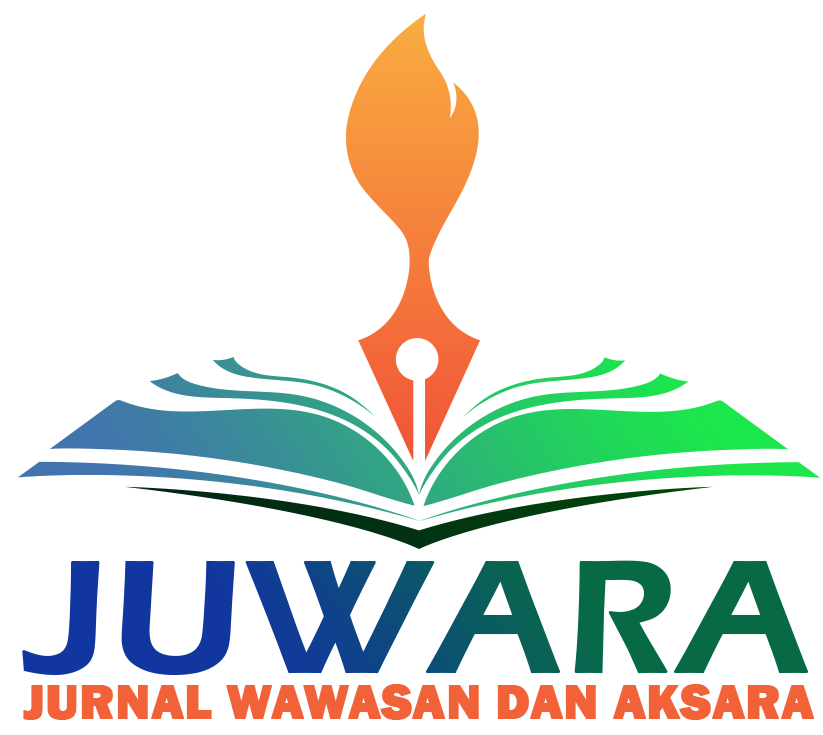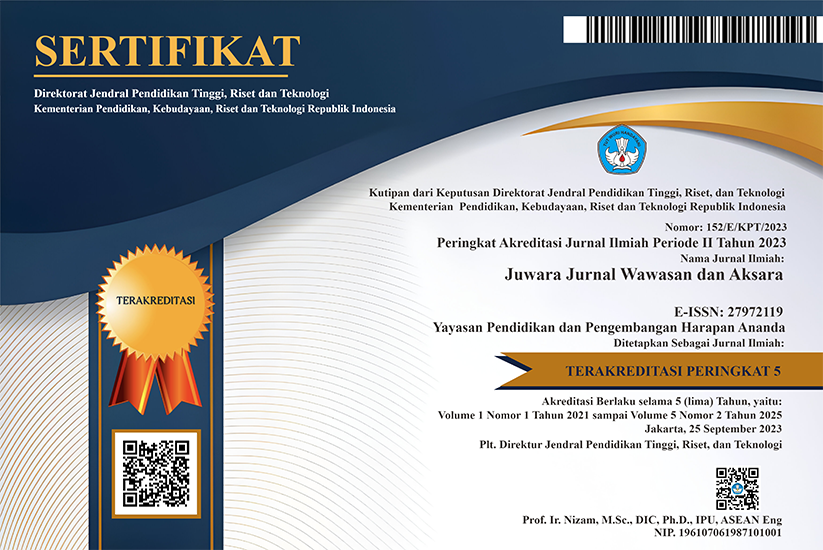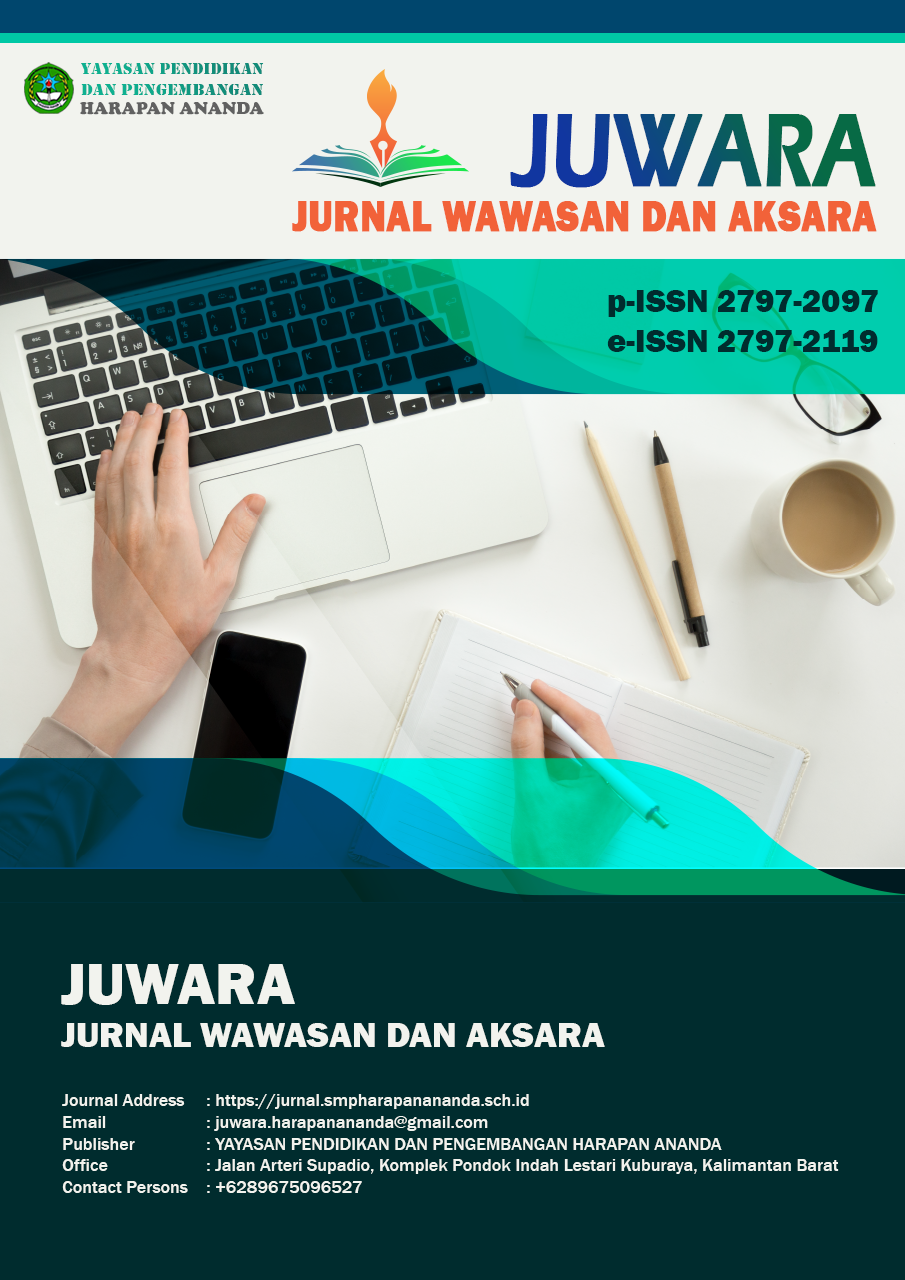Digital Literacy and Critical Thinking Skills of Students in the Era Industry 4.0
DOI:
https://doi.org/10.58740/juwara.v5i1.382Keywords:
critical thinking, digital education, digital literacy, industry 4.0Abstract
Industry 4.0 has introduced new challenges in the field of education, where digital literacy and critical thinking skills have become increasingly essential for students in navigating the ever-evolving flow of digital information. This study aims to analyze the relationship between digital literacy and students' critical thinking skills at the secondary school level. Utilizing a correlational survey method, data were collected from 250 students and analyzed using Pearson correlation and simple linear regression tests. The results indicate a significant positive relationship between digital literacy and critical thinking skills (r = 0.652, p < 0.01). Furthermore, regression analysis shows that digital literacy contributes 42.6% to the enhancement of students' critical thinking skills. These findings affirm that improving digital literacy can support the development of critical thinking through technology-based learning and more adaptive pedagogical approaches. Therefore, integrating digital literacy into the educational curriculum is crucial to equip students with essential skills to face the challenges of the digital era.
References
Aini, H., & Khuzaini, N. (2024). The influence of mathematical disposition on high school students' understanding of mathematical concepts. Union: Jurnal Ilmiah Pendidikan Matematika, 12(1), 96-115. https://doi.org/10.30738/union.v12i1.17023
Bie?kowska, J., & Sikorski, C. (2024). Integrating qualitative and quantitative methods: a balanced approach to management research. Eastern Journal of European Studies, 15(1). https://doi.org/10.47743/ejes-2024-0115
Chiu, T., & Sun, J. (2022). Investigating the relationship of technology learning support to digital literacy from the perspective of self-determination theory. Educational Psychology, 42, 1263–1282. https://doi.org/10.1080/01443410.2022.2074966
Davydov, S., Logunova, O., Maltseva, D., Sharikov, A., & Zadorin, I. (2020). Digital Literacy Concepts and Measurement. 103–120. https://doi.org/10.1007/978-3-030-33016-3_6
Dewi, R. K., Lasmana, O., Festiyed, F., Asrizal, A., Desnita, D., & Diliarosta, S. (2024). Implications and impact of digital literacy on higher education: Systematic literature review. Eduvest-Journal of Universal Studies, 4(6), 5300-5312. https://doi.org/10.59188/eduvest.v4i6.1410
Durner, E. F. (2021). Simple linear regression. In E. F. Durner, Applied plant science experimental design and statistical analysis using SAS® OnDemand for Academics (1st ed., pp. 80–145). CABI. https://doi.org/10.1079/9781789245981.0009
Facione, D. P. A. (1990). The Complete American Philosophical Association Delphi Research Report is available as ERIC Doc. No.: ED 315 423. California: California State University, Fullerton.
Gitadewi, A. J. (2024). Optimizing Digital Literacy Through Problem-Based Learning Models to Improve Student’s Critical Thinking Skills. International Journal of Current Educational Research, 3(2), 110–123. https://doi.org/10.53621/ijocer.v3i2.379
Haryanto, H., Ghufron, A., Suyantiningsih, S., & Kumala, F. N. (2022). The Correlation between Digital Literacy and Parents' Roles towards Elementary School Students' Critical Thinking. Cypriot Journal of Educational Sciences, 17(3), 828-839. https://doi.org/10.18844/cjes.v17i3.6890
Indah, R. N., Toyyibah, T., Budhiningrum, A. S., & Afifi, N. (2022). The research competence, critical thinking skills and digital literacy of Indonesian EFL students. Journal of Language Teaching and Research, 13(2), 315-324. https://doi.org/10.17507/jltr.1302.11
Indrašien?, V., Jegelevi?ien?, V., Merfeldait?, O., Penkauskien?, D., Pivorien?, J., Railien?, A., & Sadauskas, J. (2023). Critical reflection in students’ critical thinking teaching and learning experiences. Sustainability, 15(18), 13500. https://doi.org/10.3390/su151813500
Kasperski, R., Blau, I., & Ben?Yehudah, G. (2022). Teaching digital literacy: Are teachers’ perspectives consistent with actual pedagogy? Technology, Pedagogy and Education, 31, 615–635. https://doi.org/10.1080/1475939X.2022.2091015
Lumbanbatu, I. M. F., & Mayasari, D. (2021, December). Digital Literacy based on Multiple Intelligences Integrated with 4C (Critical, Creative, Collaborative and Communication) to Improve Students Learning Outcome. In International Seminar on Language, Education, and Culture (ISoLEC 2021) (pp. 152-157). Atlantis Press. https://doi.org/10.2991/assehr.k.211212.028
Mabini, H., & Gallardo, R. (2024). Digital Literacy and Critical Thinking Skills Among Grade 5 Learners. International Journal of Innovative Science and Research Technology (IJISRT), 9(6), 4. https://doi.org/10.38124/ijisrt/ijisrt24jun413
Mastuti, A. G., Abdillah, A., Sehuwaky, N., & Risahondua, R. (2022). Revealing students' critical thinking ability according to facione's theory. Al-Jabar: Jurnal Pendidikan Matematika, 13(2), 261-272. https://doi.org/10.24042/ajpm.v13i2.13005
Meirbekov, A., Maslova, I., & Gallyamova, Z. (2022). Digital education tools for critical thinking development. Thinking Skills and Creativity, 44, 101023. https://doi.org/10.1016/j.tsc.2022.101023
Mosquete, J. K., & Libago, M. A. R. (2025). The Influence of Digital Literacy and Information Literacy on Critical Thinking Skills Among Teacher Education Students. EPRA International Journal of Multidisciplinary Research (IJMR), 11 (1), 1155-1165. https://doi.org/10.36713/epra19905
Munawwarah, M., Laili, N., & Tohir, M. (2020). Keterampilan berpikir kritis mahasiswa dalam memecahkan masalah matematika berdasarkan keterampilan abad 21. Alifmatika: Jurnal Pendidikan dan Pembelajaran Matematika, 2(1), 37-58. https://doi.org/10.35316/alifmatika.2020.v2i1.37-58
Musa, M., Arifin, A., Sukmawati, E., Zulkifli, Z., & Mahendika, D. (2023). The relationship between students’ spiritual and emotional intelligence with subjects learning outcomes. Journal on Education, 5(4), 11729-11733. https://doi.org/10.31004/joe.v5i4.2128
N, Revati. (2024). Integrating Constructivism, Science Education, and Technology: An Investigation into Pedagogical Strategies, Student Engagement, and Learning Outcomes in the Digital Age. International Journal for Research in Applied Science and Engineering Technology, 12 (12), 1021-1025=6. https://doi.org/10.22214/ijraset.2024.65933
Panduwinata, L., & Setiawati, F. (2024). Digital Literacy's Influence on Critical Thinking Skills of Office Administration Education Students at UNESA. Jurnal Simki Pedagogia, 7(2), 609-618. https://doi.org/10.29407/jsp.v7i2.733
Rosalina, D., Yuliari, K., Setianingsih, D., & Zati, M. R. (2021). Factors influencing the digital literacy competency of college students in the Industrial Revolution Era 4.0. International Journal of Economic, Business & Applications, 6(2), 81-92. https://doi.org/10.31258/ijeba.6.2.81-92
Schober, P., Boer, C., & Schwarte, L. A. (2018). Correlation Coefficients: Appropriate Use and Interpretation. Anesthesia & Analgesia, 126(5), 1763–1768. https://doi.org/10.1213/ANE.0000000000002864
Septiany, L. D., Puspitawati, R. P., Susantini, E., Budiyanto, M., Purnomo, T., & Hariyono, E. (2024). Analysis of high school students’ critical thinking skills profile according to Ennis indicators. IJORER: International Journal of Recent Educational Research, 5(1), 157-167. https://doi.org/10.46245/ijorer.v5i1.544
Setiawardani, W., Robandi, B., & Djohar, A. (2021). Critical Pedagogy in the Era of the Industrial Revolution 4.0 to Improve Digital Literacy Students Welcoming Society 5.0 in Indonesia. 5, 107. https://doi.org/10.22460/PEJ.V5I1.2073
Singh, S., & Singh, J. K. (2025). ICT Enriched Constructivist Approach. International Journal for Multidisciplinary Research, 7(1), 1-5. https://doi.org/10.36948/ijfmr.2025.v07i01.35969
Siregar, T. E., Luali, N., Vinalistyosari, R. C., Hanurawan, F., & Anggraini, A. E. (2024). Implementation of Vygotsky’s Constructivism Learning Theory through Project-Based Learning (PjBL) in Elementary Science Education. Al Qalam: Jurnal Ilmiah Keagamaan dan Kemasyarakatan, 18(4), 2586-2607. https://doi.org/10.35931/aq.v18i4.3620
Sjarifudin, D., Widyastuti, T., & Suroso, S. (2023). The Effect of Self-Efficacy, Competence, Work Discipline, Employee Engagement on Work Performance and Work Motivation: Empirical Study on Umrah Travel Agency. Formosa Journal of Sustainable Research, 12. https://doi.org/10.55927/fjsr.v2i12.6963
Syerlita, R., & Siagian, I. (2024). Dampak Perkembangan Revolusi Industri 4.0 Terhadap Pendidikan Di Era Globalisasi Saat Ini. Journal on Education, 7(1), 3507-3515. https://doi.org/10.31004/joe.v7i1.6945
Wibowo, S., Wangid, M. N., & Firdaus, F. M. (2025). The Relevance of Vygotsky's Constructivism Learning Theory with the Differentiated Learning Primary Schools. Journal of education and learning (EduLearn), 19(1), 431-440. https://doi.org/10.11591/edulearn.v19i1.21197
Downloads
Published
How to Cite
Issue
Section
License
Copyright (c) 2025 Widiastuti Furbani, Felisia Purnawanti, A. Erni Ratna Dewi, Nila Sari, Thoriq

This work is licensed under a Creative Commons Attribution-NonCommercial 4.0 International License.
JUWARA: Jurnal Wawasan dan Aksara provides open access to anyone so that the information and findings in these articles are useful for everyone. This journal's article content can be accessed and downloaded for free, following the creative commons license used.




















